 Earlier this month, a Washington state trial judge struck down the state’s recently enacted Business & Occupation Tax (“B&O) measure on large out-of-state financial institutions finding that although the tax measure was facially neutral, the purpose and effect of the tax was discriminatory against out-of-state banks. See Washington Banker’s Ass’n. et ano. v. State of Washington et al., Docket No. 19-2-29262-8 SEA (Wa. Kings County Super. Ct. May 15, 2020). As background, the Washington Bankers Association and American Bankers Association (collectively “Bankers Associations”) filed a challenge to invalidate state House Bill 2167, which seeks to impose a higher B&O tax on out-of-state financial institutions whose annual net income equals to or exceeds $1 billion (the measure would nearly double the B&O tax on out-of-state financial institutions from 1.5% to 2.7%). The Bankers Associations sought to invalidate the law, which became effective January 1, 2020, on the grounds that the measure violates: (1) the state’s constitutional requirement to introduce a bill at least 10 days prior to the adjournment of a legislative session; and (2) the U.S. Constitution’s Commerce Clause because it discriminates against out-of-state financial institutions by imposing a higher tax rate on out-of-state financial institutions versus in-state institutions. On February 13, 2020, the trial court dismissed the Bankers Associations’ state constitutional challenge, finding that the court was prohibited from looking into legislative procedures preceding the enactment of a statute that is “properly signed and appears fair on its face.” However, the judge’s decision preserved the Bankers Associations’ federal constitutional cause of action i.e., the B&O tax measure violates the Commerce Clause because it discriminates against out-of-state financial institutions by creating a differential tax rate for in-state versus out-of-state financial institutions. Upon further briefing, both parties moved for summary judgement and oral argument was held in the matter. Continue Reading ›
Earlier this month, a Washington state trial judge struck down the state’s recently enacted Business & Occupation Tax (“B&O) measure on large out-of-state financial institutions finding that although the tax measure was facially neutral, the purpose and effect of the tax was discriminatory against out-of-state banks. See Washington Banker’s Ass’n. et ano. v. State of Washington et al., Docket No. 19-2-29262-8 SEA (Wa. Kings County Super. Ct. May 15, 2020). As background, the Washington Bankers Association and American Bankers Association (collectively “Bankers Associations”) filed a challenge to invalidate state House Bill 2167, which seeks to impose a higher B&O tax on out-of-state financial institutions whose annual net income equals to or exceeds $1 billion (the measure would nearly double the B&O tax on out-of-state financial institutions from 1.5% to 2.7%). The Bankers Associations sought to invalidate the law, which became effective January 1, 2020, on the grounds that the measure violates: (1) the state’s constitutional requirement to introduce a bill at least 10 days prior to the adjournment of a legislative session; and (2) the U.S. Constitution’s Commerce Clause because it discriminates against out-of-state financial institutions by imposing a higher tax rate on out-of-state financial institutions versus in-state institutions. On February 13, 2020, the trial court dismissed the Bankers Associations’ state constitutional challenge, finding that the court was prohibited from looking into legislative procedures preceding the enactment of a statute that is “properly signed and appears fair on its face.” However, the judge’s decision preserved the Bankers Associations’ federal constitutional cause of action i.e., the B&O tax measure violates the Commerce Clause because it discriminates against out-of-state financial institutions by creating a differential tax rate for in-state versus out-of-state financial institutions. Upon further briefing, both parties moved for summary judgement and oral argument was held in the matter. Continue Reading ›
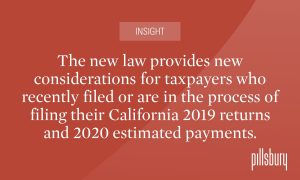 SeeSALT partners Jeff Vesely, Craig Becker, Carley Roberts and Breann Robowski break down Governor Newsom’s proposed tax legislation, recently passed by the California Legislature, to raise additional income tax revenue to assist in balancing the California budget. (AB 85). The Senate and Assembly each achieved the two-thirds majority vote required for California tax increases (27-11 in the Senate and 56-20 in the Assembly), with Governor Newsom expected to sign the legislation later this week.
SeeSALT partners Jeff Vesely, Craig Becker, Carley Roberts and Breann Robowski break down Governor Newsom’s proposed tax legislation, recently passed by the California Legislature, to raise additional income tax revenue to assist in balancing the California budget. (AB 85). The Senate and Assembly each achieved the two-thirds majority vote required for California tax increases (27-11 in the Senate and 56-20 in the Assembly), with Governor Newsom expected to sign the legislation later this week. SeeSALT Blog
SeeSALT Blog


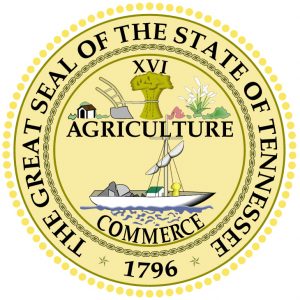 The Tennessee Court of Appeals held that a single member limited liability company (SMLLC) that is disregarded for federal income tax purposes is regarded for Tennessee excise tax purposes unless its single member is classified as a corporation for federal income tax purposes. The court also held that proceeds from the settlement of a legal malpractice claim constitute “business earnings” subject to excise tax where the proceeds represent lost business revenue. EmeraChem Power, LLC v. Gerregano, No. E2019-00292-COA-R3-CV (Tenn. Ct. App. June 1, 2020).
The Tennessee Court of Appeals held that a single member limited liability company (SMLLC) that is disregarded for federal income tax purposes is regarded for Tennessee excise tax purposes unless its single member is classified as a corporation for federal income tax purposes. The court also held that proceeds from the settlement of a legal malpractice claim constitute “business earnings” subject to excise tax where the proceeds represent lost business revenue. EmeraChem Power, LLC v. Gerregano, No. E2019-00292-COA-R3-CV (Tenn. Ct. App. June 1, 2020).  Earlier this month, a Washington state trial judge struck down the state’s recently enacted Business & Occupation Tax (“B&O) measure on large out-of-state financial institutions finding that although the tax measure was facially neutral, the purpose and effect of the tax was discriminatory against out-of-state banks. See Washington Banker’s Ass’n. et ano. v. State of Washington et al., Docket No. 19-2-29262-8 SEA (Wa. Kings County Super. Ct. May 15, 2020). As background, the Washington Bankers Association and American Bankers Association (collectively “Bankers Associations”) filed a challenge to invalidate state House Bill 2167, which seeks to impose a higher B&O tax on out-of-state financial institutions whose annual net income equals to or exceeds $1 billion (the measure would nearly double the B&O tax on out-of-state financial institutions from 1.5% to 2.7%). The Bankers Associations sought to invalidate the law, which became effective January 1, 2020, on the grounds that the measure violates: (1) the state’s constitutional requirement to introduce a bill at least 10 days prior to the adjournment of a legislative session; and (2) the U.S. Constitution’s Commerce Clause because it discriminates against out-of-state financial institutions by imposing a higher tax rate on out-of-state financial institutions versus in-state institutions. On February 13, 2020, the trial court dismissed the Bankers Associations’ state constitutional challenge, finding that the court was prohibited from looking into legislative procedures preceding the enactment of a statute that is “properly signed and appears fair on its face.” However, the judge’s decision preserved the Bankers Associations’ federal constitutional cause of action i.e., the B&O tax measure violates the Commerce Clause because it discriminates against out-of-state financial institutions by creating a differential tax rate for in-state versus out-of-state financial institutions. Upon further briefing, both parties moved for summary judgement and oral argument was held in the matter.
Earlier this month, a Washington state trial judge struck down the state’s recently enacted Business & Occupation Tax (“B&O) measure on large out-of-state financial institutions finding that although the tax measure was facially neutral, the purpose and effect of the tax was discriminatory against out-of-state banks. See Washington Banker’s Ass’n. et ano. v. State of Washington et al., Docket No. 19-2-29262-8 SEA (Wa. Kings County Super. Ct. May 15, 2020). As background, the Washington Bankers Association and American Bankers Association (collectively “Bankers Associations”) filed a challenge to invalidate state House Bill 2167, which seeks to impose a higher B&O tax on out-of-state financial institutions whose annual net income equals to or exceeds $1 billion (the measure would nearly double the B&O tax on out-of-state financial institutions from 1.5% to 2.7%). The Bankers Associations sought to invalidate the law, which became effective January 1, 2020, on the grounds that the measure violates: (1) the state’s constitutional requirement to introduce a bill at least 10 days prior to the adjournment of a legislative session; and (2) the U.S. Constitution’s Commerce Clause because it discriminates against out-of-state financial institutions by imposing a higher tax rate on out-of-state financial institutions versus in-state institutions. On February 13, 2020, the trial court dismissed the Bankers Associations’ state constitutional challenge, finding that the court was prohibited from looking into legislative procedures preceding the enactment of a statute that is “properly signed and appears fair on its face.” However, the judge’s decision preserved the Bankers Associations’ federal constitutional cause of action i.e., the B&O tax measure violates the Commerce Clause because it discriminates against out-of-state financial institutions by creating a differential tax rate for in-state versus out-of-state financial institutions. Upon further briefing, both parties moved for summary judgement and oral argument was held in the matter. 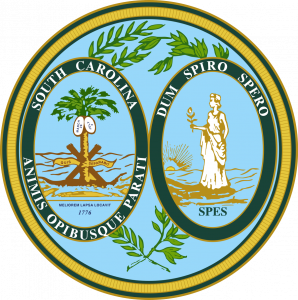 values of most commercial and industrial real properties to 15% within a five-year period violated the 4R Act because it discriminated against railroad properties.
values of most commercial and industrial real properties to 15% within a five-year period violated the 4R Act because it discriminated against railroad properties.  a two-thirds supermajority vote like local special taxes introduced by mayors or local boards of supervisors. The same deciding judge already issued a pair of rulings in favor of San Francisco last July on similar supermajority vote validity-challenging actions concerning San Francisco’s Homelessness Gross Receipts Tax and Early Care and Education Commercial Rents Tax. Both previous rulings are currently under separate appeals in the First District Court of Appeal.
a two-thirds supermajority vote like local special taxes introduced by mayors or local boards of supervisors. The same deciding judge already issued a pair of rulings in favor of San Francisco last July on similar supermajority vote validity-challenging actions concerning San Francisco’s Homelessness Gross Receipts Tax and Early Care and Education Commercial Rents Tax. Both previous rulings are currently under separate appeals in the First District Court of Appeal.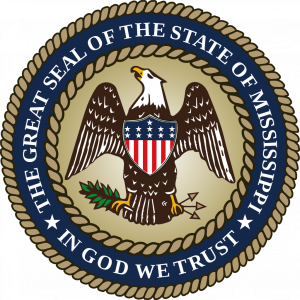 The Mississippi Supreme Court rejected a taxpayer’s corporate income tax refund claim as untimely, holding that the timely issuance of a notice of examination and commencement of an examination tolled the statute of limitations for the Department of Revenue to make an assessment or effect a refund, but not for the taxpayer to claim a refund. Caesars Entm’t, Inc. v. Miss. Dep’t of Revenue, No. 2019-CA-00155-SCT (Miss. May 7, 2020).
The Mississippi Supreme Court rejected a taxpayer’s corporate income tax refund claim as untimely, holding that the timely issuance of a notice of examination and commencement of an examination tolled the statute of limitations for the Department of Revenue to make an assessment or effect a refund, but not for the taxpayer to claim a refund. Caesars Entm’t, Inc. v. Miss. Dep’t of Revenue, No. 2019-CA-00155-SCT (Miss. May 7, 2020). 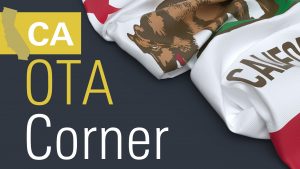
 In this burgeoning era of creative and aggressive tax collecting efforts by localities, the New Hampshire Supreme Court has unanimously struck down a state statute from permitting localities to profit from sales of properties acquired by tax deed after the passage of three years. The Court held the state statute unconstitutional under the state constitution’s taking clause, which prohibits localities from taking property without just compensation.
In this burgeoning era of creative and aggressive tax collecting efforts by localities, the New Hampshire Supreme Court has unanimously struck down a state statute from permitting localities to profit from sales of properties acquired by tax deed after the passage of three years. The Court held the state statute unconstitutional under the state constitution’s taking clause, which prohibits localities from taking property without just compensation.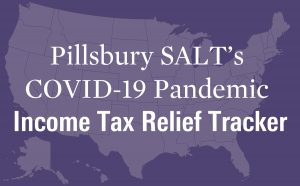 State income tax relief in the form of tax return filing and tax payment extensions, and the deployment of related administrative guidance, has evolved rapidly in the last several weeks in the face of the COVID-19 crisis. Of the 45 jurisdictions, including the District of Columbia, that impose an income tax on corporations, 40 have established income tax relief to corporate taxpayers in the form of tax payment extensions, return filing extensions and/or various penalty and interest relief during the extension period. Arkansas, Minnesota and Montana are playing hardball, affirmatively announcing no income tax relief will be provided to corporate taxpayers. Massachusetts has announced it purportedly does not have the authority to extend income tax filing or payment deadlines to corporations but has provided late-filing and late-payment penalty relief. And unique as always, Florida still appears to be on the fence.
State income tax relief in the form of tax return filing and tax payment extensions, and the deployment of related administrative guidance, has evolved rapidly in the last several weeks in the face of the COVID-19 crisis. Of the 45 jurisdictions, including the District of Columbia, that impose an income tax on corporations, 40 have established income tax relief to corporate taxpayers in the form of tax payment extensions, return filing extensions and/or various penalty and interest relief during the extension period. Arkansas, Minnesota and Montana are playing hardball, affirmatively announcing no income tax relief will be provided to corporate taxpayers. Massachusetts has announced it purportedly does not have the authority to extend income tax filing or payment deadlines to corporations but has provided late-filing and late-payment penalty relief. And unique as always, Florida still appears to be on the fence. On April 3, 2020, New York State enacted the 2021 fiscal year budget (Budget). The Budget contains several tax measures including decoupling from taxpayer relief provisions of the Coronavirus Aid, Relief, and Economic Security Act (CARES Act). The CARES Act was signed into law on March 27, 2020 with the primary objective to provide economic relief and greater liquidity to American taxpayers facing hardship because of the COVID-19 crisis. Specifically, the Budget decouples from taxpayer favorable provisions in the CARES Act including the increase to the permitted business interest expense deduction and the beneficial NOL provisions. As a result, New York taxpayers will not receive the benefit of the CARES Act relief provisions for New York tax purposes.
On April 3, 2020, New York State enacted the 2021 fiscal year budget (Budget). The Budget contains several tax measures including decoupling from taxpayer relief provisions of the Coronavirus Aid, Relief, and Economic Security Act (CARES Act). The CARES Act was signed into law on March 27, 2020 with the primary objective to provide economic relief and greater liquidity to American taxpayers facing hardship because of the COVID-19 crisis. Specifically, the Budget decouples from taxpayer favorable provisions in the CARES Act including the increase to the permitted business interest expense deduction and the beneficial NOL provisions. As a result, New York taxpayers will not receive the benefit of the CARES Act relief provisions for New York tax purposes.